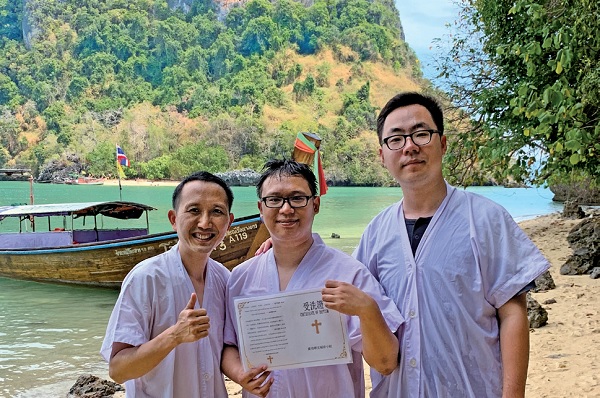The aroma of coffee
Dual Vocational Mission Trip
Picture/Li Weiliang

Biblical Foundations for Bivocational Missions
Once I attended a missionary meeting, the participants introduced themselves first. Everyone was either a pastor or a full-time agency staff member. There was a kind of pressure in the air that those who were not "full-time" were not spiritual. Finally, when it came to me, I was like a child oppressed in a corner. Only Sarai said: "I am a full-time... Christian." The whole audience was stunned for half a second, and then burst into knowing laughter.
We all should be full-time Christians, right?
When you go out into the world to work as a full-time Christian, you become a bi-vocational Christian; when you work as a full-time Christian among unreached peoples, you become a bi-vocational missionary. If the former is local coffee beans, the latter is exported coffee beans. Its function is nothing more than turning cups of plain water into drinks full of coffee aroma, bringing the kingdom of heaven to the world. One is a fellow countryman, the other is a nation, but the spirit of both professions is the same.

▲Dual career: attending college student camps and handling company business at the same time.
During the three missionary journeys, there is clear evidence that Paul stayed close to the local environment and preached while working:
The first missionary journey: Neither Barnabas nor Barnabas needed the authority to "live by the gospel" (see 1 Corinthians 9:4-6, 15a);
The second missionary journey: hard work, working day and night (refer to 2 Thessalonians 3:7-8), making tents on weekdays, and preaching the gospel on the Sabbath (refer to Acts 18:2c-4);
The Third Missionary Journey: Use your hands to provide for yourself and your co-workers (see Acts 20:33-34).
Even when Paul was later taken to Rome as a prisoner, Luke emphasized that Paul was self-supporting: "Paul lived in the house he rented for two full years. He received everyone who came to him." (Acts of the Apostles) Ecclesiastes 28:30)
In fact, dual-vocational missions are an extension of dual-vocational service; conversely, Paul established dual-vocational missions. After establishing the church, he appointed pastors so that the pastors and believers could serve dual-vocationally in the local church (see Acts 14: twenty three). The author is from Hong Kong and has established a church in the local area for more than ten years. In the eight years since he came to southern Thailand, he has continued Paul’s dual-vocational missionary service. In the same way, Christian "business mission" is similar to "local business"; Christian businesses that are determined to transform society should not just appear in unreached places; local businessmen bring the influence of the Kingdom of God locally through business. , it should be the mainstream. From Jerusalem to the ends of the earth, bivocational ministry should spread so naturally.
And Paul is not without the right to rely on the gospel to make a living like Jesus and the Twelve Apostles. He found his own way to set an example for believers in dual-vocational service. "You yourselves know how to imitate us, for we did not idle among you, nor did anyone eat in vain, but toiled hard, working day and night... This is not because we have no rights, but because we want to give you Be an example, so that you may imitate us.” (2 Thessalonians 3:7-9, NLT)
When bivocational ministry is seen as the norm, as a matter of course, a renaissance in the church and missions will come. Pastor Wu Zhenzhi once said: "I want all of you here to be pastors. But what if you all become pastors? If one out of every ten Christians in Hong Kong becomes a pastor, then there will be nine left! These nine What to do? Nothing to do? Does God just call those pastors?”
Pastor Wu pays attention to the problems of most believers. Yes, every believer must become a full-time Christian! Pastor Wu heard that I would become a teacher after graduation, but he did not persuade me to change my career to become a pastor. As a result, God used me, a little teacher, to lead hundreds of students to the Lord. Mr. Sun Yat-sen, who is admired by everyone, changed his ambition to be a priest when he was 21 years old, which later ended China's five thousand years of monarchy and paved the way for the National Government to believe in Christianity.

▲The author and the group of college students he serves.
The launch of a dual vocational mission trip
In 2010, my family went on a mission trip to Thailand again. I shared the concept of "dual-vocational missions" with my mother church and CITIC Mission. Although I had no experience to refer to, it was rare that both parties voted in favor and tried their best to integrate with my family a feasible plan for a modern dual-vocational missionary family.
We, as a couple, decided not to take a salary from the church and give it a try as a bi-vocational missionary to set an example for full-time Christians. The missionary committee knew that the salary in Tainan was not enough to cover the expenses of my family’s entire missionary package. Based on practical considerations, we made a separation between the missionaries and the “Philippi Church” (refer to Philippians 4:15-18). Scope of responsibility: Missionaries are responsible for food, clothing, housing, and transportation, including their own cars, rent, water, electricity, firewood, rice, oil, and salt, and all daily necessities; the church is responsible for ministry (including a large ministry vehicle), medical insurance, and MPF (mandatory provident fund scheme, A retirement security policy in Hong Kong), work report expenses, children’s local education and parents’ living allowance, etc.
After arriving in southern Thailand, we both furthered our studies in Thai and started ministry in a moderate manner. My wife teaches two days a week, and I finish my writing task first. In the first two years, my family used our savings to support our living. In the second year, God led my wife to work as a full-time teacher in a middle school, where she started ministry to middle school students. I also started privately teaching languages, football, and swimming, and the family’s income began to grow. You can live hand to mouth.

▲The small shareholders of the factory have been exposed to faith for a long time. God sent the author into the factory and took him to the group. Finally, he was baptized into the Lord.
Challenges of Bivocational Mission
When you leave your homeland, you should always be aware of why you came here. Therefore, when looking for a job, we should especially follow the principle of "It is not my work that controls me, but I control my work" (see Romans 12:2). Either we should build a church in a work environment or we should not build a church outside of work. It is best to do both together. Do.
The group I serve are college students, so I have been teaching Chinese part-time at the university for five years. I can not only directly preach the gospel to students, but also have enough time to serve. Don’t think that the salary for teaching in a university is huge. My hourly salary is only $16 US dollars an hour. Other teachers are happy that Thai schools often have holidays and activities, but because I am paid hourly, preparing lessons, correcting, issuing papers, and making report cards are all "after-sales services". After a month, my salary is only about US$$300. It’s 1/3 of my wife’s. I didn't go looking for other jobs. I was very happy to serve among college students and treat them to meals.
But as a foreigner, it is too troublesome to apply for a work visa. In 2017, although the university still asked me to teach, I did not get a work visa. In order not to violate the law, I had to stop working. It is difficult to find a job in a foreign country, and it is even harder to find a job suitable for ministry. Eight months later, a suitable job appeared, but it was a job I had never done before: working in a factory doing export sales. Because the factory meets one condition I insist on: being close to a university. Although I knew nothing about factories or sales, like missionaries in history, my language skills were valued. In this small place, they were surprised to find a person who spoke Chinese, English and Thai, and I became a member of the management team with zero experience.
The interview experience also reflected the struggles and prayers of a bivocational missionary. In the past, I had group spiritual practice with college students in the morning five days a week, had individual appointments or preached the gospel in the cafeteria at noon, and held work reports and camps every year. However, the time of my new job is limited for this. I boldly argued with my boss, and after consideration, he finally agreed to give me more time and vacation. Of course, business society is very fair, and my salary is particularly low among my peers and peers. But since the beginning, I have never fought for equal pay for equal work. I have not forgotten that I am "exporting coffee" in order to spread the aroma among unreached peoples. If I were seeking a salary, I would not have chosen to "export" in the first place.

▲Coffee beans need to be ground to produce the aroma: The author and the university team. On the right is a full-time campus colleague, and the other two are dual-career colleagues.
The quality of bivocational ministers
ambition
Whether you have a dual job or a full-time job, the key is not your status, but your dedication. In fact, missionary work is the main thing, and dual employment is just a means. Peter, a full-time man, and Paul, a dual-career man, were unreserved servants of God. This is extremely important. Bi-vocational missionaries with insufficient dedication will eventually become second-rate missionaries; just as bi-vocational believers with insufficient dedication are far less trustworthy than full-time pastors. When such bivocational ministers encounter difficulties or have to make sacrifices, they will just fight and walk. Only by having the will to put the Kingdom of God first can we persist in walking on the narrow road amidst the difficulties of life in a foreign country, not forgetting the vision, and run straight to the finish line of the marathon.
Acts Chapter 18 Verses 1-4 record that Paul "made a living by making tents while preaching". What is also wonderful is verse 5, where co-worker Luke describes Paul as "concentrating on preaching" (Union Version, revised version). Although a person has dual vocations, he gives the impression that he is “concentrating on preaching.” I would like to use Paul’s example and Proverbs 4:23 to encourage colleagues who have dual vocations: “Above all else, guard your heart; Because the results of life come from the heart.”
Diligent
You can't see your will, but you can see your hard work. The manifestation of your will is your hard work. Dual-career means two jobs, which are of course busier, require better time management, and require more diligence. Notice Paul's repeated reference to industry. He “worked harder than all the apostles” (cf. 1 Corinthians 15:10). His team was industrious. Timothy “worked hard in the work of the Lord, just as I did” (cf. 1 Corinthians 16:10). Titus "worked together for you" (see 2 Corinthians 8:23). These passages encourage believers to be as diligent as he was. This is not an accident; it is an inevitable necessity of dual-vocational service.
In "Give Me Back the Church," I describe my "fulfilling" career as a teacher and church founder in Hong Kong. Now you are a full-time salesperson, working five days a week, but you often have college student gatherings and appointments in the morning, noon and evening, and church services on Saturdays and Sundays. How do you maintain a good spirit? Now I have a new habit. I get up at a quarter past six and make a pot of freshly ground coffee for each of the couple to stimulate the spirit of living for the Lord throughout the day.
I firmly believe that if every coffee bean is willing to grind itself and integrate into the world, the world will be filled with the aroma of Christ.

▲The author leads students to pray and accept the Lord.
Looking to the future - the dream of building a dual-vocational school
The business missionary work mentioned in issue 55 of "Kingdom of God" includes opening schools. This is exactly the vision that God has placed in our hearts as a couple in the past two years. Establishing a Christian international school in a province where the name of Jesus has not yet been praised by 99.7% people is an important strategy for transforming the region and building disciples for all people. Christian education has transformed Hong Kong for a hundred years. Now we hope to bring blessings here and build the first Christian high school to provide high-quality education and train high-quality disciples. Preparatory work is in full swing. CITIC Mission and the parent association have approved the land purchase plan. We need to raise $1.5 million US dollars. In addition, the following talents are also needed: project managers, designers, architects, accountants, (AP) course directors and teachers of various subjects (taught in English).
For information about our ministry or school building, please emailyukstone2013@gmail.comor China Believers Evangelistic Association (Hong Kong).
Further reading and video access:
"CITIC Biography" August 2019 issue - the author's ministry report.
The author and his wife have been engaged in education for 20 years and are now dual-career missionaries. They have served in Thailand for 12 years and have a daughter and a son. He is the author of "Give Me Back the Church" and "Drawing Window on the Earth".
